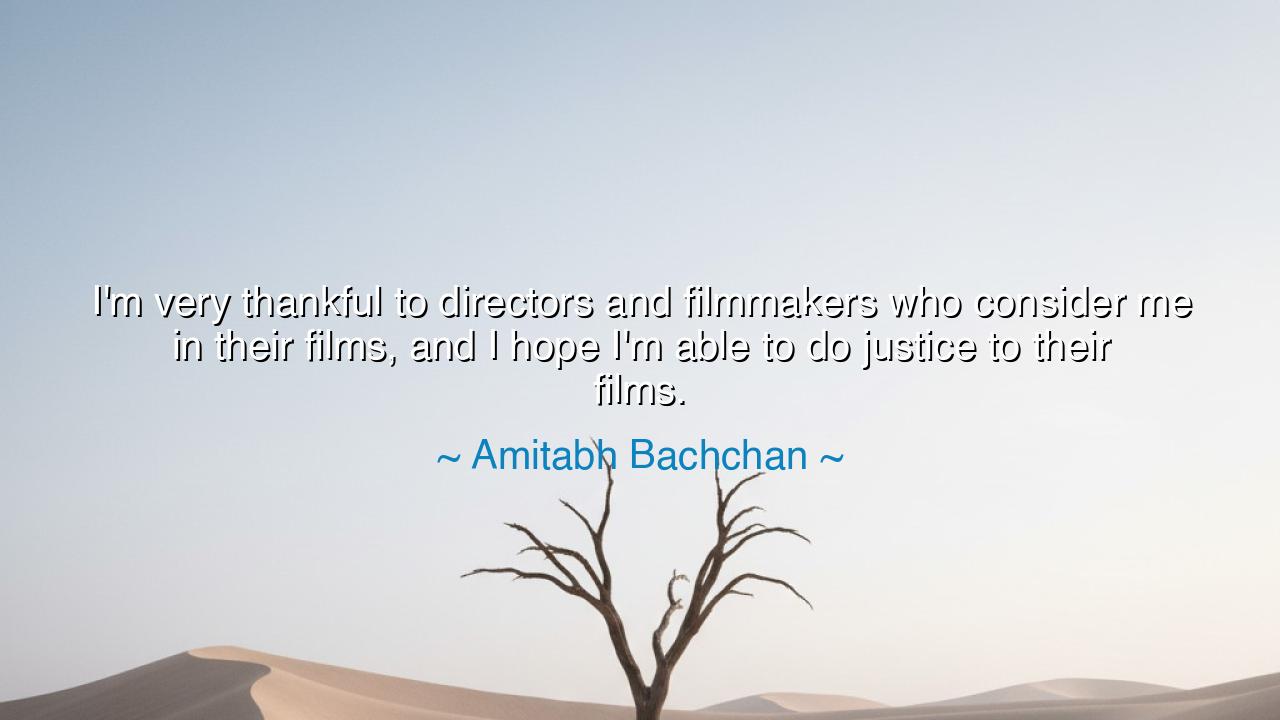
I'm very thankful to directors and filmmakers who consider me in
I'm very thankful to directors and filmmakers who consider me in their films, and I hope I'm able to do justice to their films.






When Amitabh Bachchan speaks, “I’m very thankful to directors and filmmakers who consider me in their films, and I hope I’m able to do justice to their films,” his words resound with the humility of one who has stood at the summit of fame yet remembers that his greatness is built upon the trust of others. Though he is celebrated as a titan of cinema, he does not place himself as the source of glory, but as a servant to the vision of directors and filmmakers. His words remind us that no matter how bright the star, it shines only because others set the stage upon which it may gleam.
At the heart of this quote lies gratitude — a recognition that art is never created in isolation. A film is a tapestry woven by many hands: the writer who imagines, the director who guides, the crew who labor, the actors who embody. Bachchan’s thankfulness shows the wisdom of one who sees beyond himself, acknowledging that his legacy rests upon a collective act of creation. Such humility elevates him, for the one who gives credit freely shows himself worthy of even greater honor.
Yet his words also carry the weight of responsibility. In saying he hopes to “do justice to their films,” Bachchan reveals that opportunity is not merely a gift to be enjoyed, but a trust to be safeguarded. To be chosen by a filmmaker is to be entrusted with a vision, with characters and stories that may endure for generations. He sees his task not as self-promotion, but as fidelity to the story. Just as a priest safeguards a sacred ritual, so must an actor embody the truth of the script, honoring the trust placed in him.
History gives us mirrors of this humility. Consider Molière, the French playwright and actor, who performed not for his own fame alone but to bring to life the deeper truths of human folly and wisdom that his works carried. Or think of the ancient storytellers of India, who recited the Mahabharata not for themselves but to preserve the dharma of their people. In the same way, Bachchan sees himself as a vessel for storytelling, not the sole architect of its power.
His gratitude also reveals a profound truth about longevity. For decades, directors have continued to seek him out, and yet, instead of entitlement, he expresses thankfulness. This is the mark of one who has walked long in the world and learned that nothing should be taken for granted. The opportunity to continue working is not owed, but gifted. To remain grateful even after great success is to keep one’s spirit young, alive, and honorable.
For us, the lesson is clear: whatever role we play in life, whether great or small, we are part of something larger. We must be thankful to those who open doors for us, and we must strive to do justice to the opportunities entrusted to us. Talent alone is not enough; humility, responsibility, and gratitude are what transform work into legacy.
Therefore, let these words be passed down: when life grants you the chance to serve, to create, or to lead, accept it not with pride alone but with humility. Be thankful to those who trusted you, and labor with all your heart to honor that trust. For as Amitabh Bachchan shows us, true greatness is not in being chosen, but in being faithful to the vision you are chosen to uphold. In this lies the crown of lasting honor.






AAdministratorAdministrator
Welcome, honored guests. Please leave a comment, we will respond soon